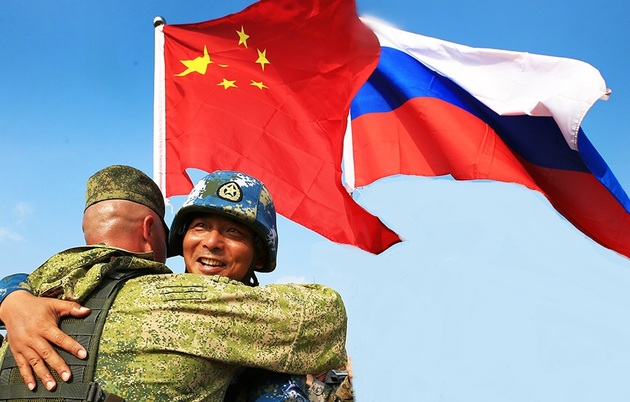China has welcomed Russian troops to hold joint strategic drills for the first time next week on the territory of the People's Republic as part of growing ties between Beijing and Moscow, Newsweek repors.
Russian personnel were met with a warm reception over the weekend as Chinese People's Liberation Army Lieutenant General Liu Xiaowu, deputy commander of the Western Theater Command and commanding officer of Chinese forces in the upcoming exercise, presented a bouquet of flowers to members of the Russian military delegation visiting ahead of the Zapad-Interaction, or West-Interaction, drills set to play out from August 9 to 13.
Liu "remarked that in the context of the big changes and pandemic, this is the first joint strategic exercise participated by Russian troops in China," according to a readout published Monday by the Chinese Defense Ministry.
The ministry also noted that this is the fourth consecutive such training held by the Russian and Chinese militaries after the Vostok (East) 2018, Tsentr (Center) 2019 and Kavkaz (Caucasus) 2020 exercises, all of which were held across different regions of Russia.
The latest Zapad-Interaction training will mostly take place near the city of Qingtongxia in northwestern China's Ningxia Hui Autonomous Region and takes place as the U.S. pulls the last of its troops from neighboring Afghanistan, a nation in which both China and Russia seek to invest in long-term stability.
The drills are set to involve some 10,000 personnel and various types of aircraft, weaponry, equipment and vehicles from both countries, whose forces "will set up a joint command, make plans and conduct training in mixed combat groups, so as to improve the joint anti-terrorism capabilities of the troops."
As news of the ceremony emerged Monday, Russian Deputy Defense Minister Colonel-General Alexander Fomin took part in a virtual conference dedicated to the 94th anniversary of the establishment of the People's Liberation Army of China.
Fomin "noted that Russian-Chinese military cooperation is characterized by high dynamics of development, consistent expansion of areas of interaction and a great intensity of contacts," according to the Russian Defense Ministry.
He also "drew attention to the fact that the two countries regularly hold joint combat training events, and that China is one of the most active participants in the International Army Games."
These annual games are also set to begin later this month, running from August 22 to September 4, and present yet another opportunity for Chinese and Russian troops to interact.
The Russian Defense Ministry reported on Sunday that a separate contingent of Russian military personnel flew along with equipment to China to take part in three International Army Games competitions to be held in Korla of China's northwestern Xinjiang Autonomous Province. Other events will be held in Russia, where Chinese troops recently arrived with China with various materiel.
Also next month, China and Russia will train together alongside India, Kazakhstan, Kyrgyzstan, Pakistan, Tajikistan and Uzbekistan as part of the Shanghai Cooperation Organization's Peace Mission 2021 drills.
The heightened level of military collaboration between Beijing and Moscow in the defense realm was also discussed Saturday by People's Liberation Army Major General Kui Yanwei, who serves as China's defense attache at the country's embassy in Russia and also was present for Monday's videoconference.
In an article published in the Russian Defense Ministry's official Krasnaya Zvezda (The Red Star) newspaper, Kui praised the direction of Sino-Russian relations under the leadership of Presidents Xi Jinping and Vladimir Putin.
Through their guidance, "the Sino-Russian comprehensive partnership and strategic interaction in the new era has withstood the test of a pandemic and unprecedented changes in a century, reaching the highest level in all its history in all areas," Kui wrote.
"The China-Russia tandem has become an unshakable guarantee of world justice and a progressive force that contributes to world development and prosperity, firmly protecting world security and stability," he wrote.
He also took note that July marked the 20th anniversary of the Sino-Russian Treaty of Good-Neighborliness and Friendly Cooperation, which Xi and Putin renewed during a virtual meeting in late June. The two heads of state also produced a lengthy joint statement in which they discussed a relationship "based on equality, deep mutual trust, commitment to international law, support in defending each other's core interests, the principles of sovereignty and territorial integrity."
"While not being a military and political alliance, such as those formed during the Cold War, the Russian-Chinese relations exceed this form of interstate interaction," the statement said, "they are not opportunistic, are free of ideologization, involve comprehensive consideration of the partner's interests and non-interference in each other's internal affairs, they are self-sufficient and not directed against third countries, they display international relations of a new type."
The United States considers China and Russia to be its top two great power competitors and has feuded with both nations on a wide range of geopolitical issues including human rights, territorial disputes and cybersecurity, for all of which Washington charges Beijing and Moscow with regular abuses.
President Joe Biden has set out to pursue a relationship with China that has "cooperative," "competitive" and "confrontational" elements, while he sought to establish "a predictable and stable relationship" with Russia.






